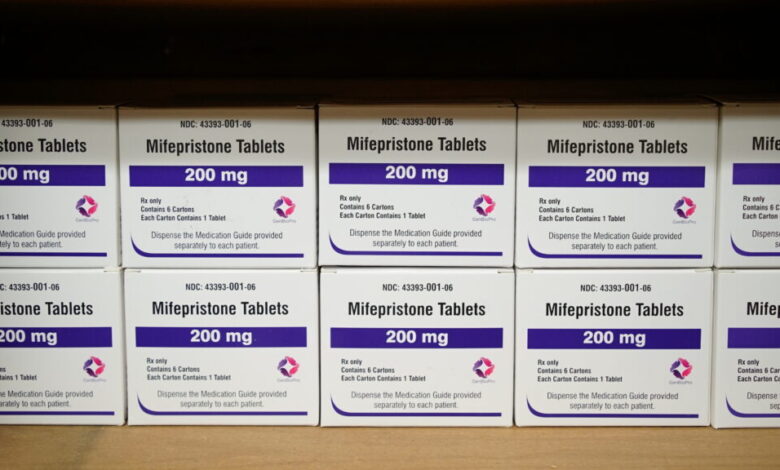Cardior, Regeneron, Nuvation, Dyne and more

New biotech newsletter launching this Thursday. Don’t miss out.
Hey there. Today, we discuss the implications of the Supreme Court’s forthcoming mifepristone evaluation on the FDA and the biopharma industry. We also examine how Covid-19 vaccine makers are faring today, and more.
The need-to-know this morning
- Novo Nordisk said it would acquire the German firm Cardior Pharmaceuticals in a deal worth up to $1.1 billion, picking up additional drug candidates for its pipeline of cardiometabolic medicines.
- The Food and Drug Administration rejected Regeneron Pharmaceuticals’ bispecific antibody treatment for two types of blood cancer, citing insufficient patient enrollment in ongoing, confirmatory clinical trials. Regeneron was seeking accelerated approval for its drug, called odronextamab, but the FDA has previously warned drugmakers that accelerated approval is contingent on having confirmatory studies substantially underway.
- Nuvation Bio said it will acquire AnHeart Therapeutics, a privately held developer of cancer drugs. Financial terms were not disclosed.
- Axsome Therapeutics said its experimental drug called AXS-12 achieved the goals of a Phase 3 study in narcolepsy.
- Dyne Therapeutics said CEO Joshua Brumm was leaving the company to pursue a career in health care investing. He will be replaced by John Cox as Dyne’s new CEO and board member. Cox was formerly CEO of Bioverativ.
Mifepristone case’s role in FDA, biopharma stability
Tomorrow, the Supreme Court will hear the opening arguments over the fate of abortion drug mifepristone. The case is of utmost importance to the biopharma industry, and to the FDA: If the drug’s approval is upended, it could hobble the agency’s authority for other medicines.
“This is a dagger at the heart of the entire industry,” one biopharma CEO told STAT. “I would venture to guess that if [the ruling stood], the industry will be thrown into complete disarray.”
If the Supreme Court unwinds the FDA’s approval decision for mifepristone, the concern is that advocates might be able to litigate against other regulatory decisions.
“This is an abortion case but at root it’s an FDA case,” a medical ethicist told STAT. “I’m hopeful the Supreme Court will recognize the business implications.”
The winners and losers of the pandemic vaccine race
The vaccines developed during the Covid-19 pandemic may have been too successful. Although at first they represented windfalls for Pfizer, its partner BioNTech, and Moderna, investors now look at those revenues as impossible to duplicate. Although Pfizer vaccine sales exceeded $80 billion, its stock price has dropped 30% over the past five years. Merck, in contrast, saw its vaccine efforts fail twice — but its stock has jumped 65%.
STAT’s Matthew Herper looks at all the biopharma players that invested in pandemic vaccines, evaluating how companies like Pfizer, Sanofi, Johnson & Johnson, and Novavax are doing today.
Advocates debate the merits of accelerated approval
More than three decades ago, Yale professor Gregg Gonsalves and other AIDS activists lobbied to create the accelerated approval pathway. But now, he’s not sure that the speed in which drugs are now approved is ultimately helping patients.
“We’re approving drugs faster and faster — [the FDA is] one of the fastest regulatory agencies in thew world — we know less and less about them, and we pay more and more for them,” he said during STAT’s Breakthrough Summit East in New York last week. “So in that way, the system is not working. We basically put access out there as this talisman of hope, but we don’t compel the companies that give us answers about what these drugs do in our bodies.”
The role of patient advocacy in drug development has grown increasingly contentious in recent years, particularly with controversial approvals of Alzheimer’s and ALS drugs. Some are thrilled to have the chance to take quickly approved medicines for diseases that would otherwise have no treatment — whether or not the efficacy has been fully established. Safety, for some, is enough. But there’s concern over whether reliable data is being generated in confirmatory studies.
Covid-19 antibody approved for immunocompromised
The FDA approved a new antibody drug to protect immunocompromised people from Covid-19. The drug, Pemgarda, is the first drug of this variety to become available after regulators pulled AstraZeneca’s Evusheld off the market in January last year for being ineffective against new Omicron variants. Patients with cancer, autoimmune disease, and genetic disorders, organ transplant recipients, and others have been anxious for a medicine that can help gird them against the rapidly mutating virus.
It’s unclear how many patients will use the prophylactic, though. Invivyd, the drug’s maker, said there are 9 million immunocompromised people in the U.S., but it will focus on the 485,000 who need it most acutely: Stem cell transplant recipients, organ transplant recipients, and blood cancer patients.
“We will explore having it available at our institution, so that our very compromised patients and the services and specialities that take care of those patients know that it’s an option,” one infectious disease specialist told STAT. “But we’re not expecting gangbusters in terms of interest.”
More reads
- Despite new Wegovy coverage, Medicare patients may face high drug costs and other hurdles, STAT
- FDA grants full approval to AbbVie’s ovarian cancer therapy, Reuters
- U.S.-China decoupling poses supply chain risk for drug companies, Wall Street Journal
- Intellia opts out of hemophilia B gene editing work with Regeneron, FierceBiotech



